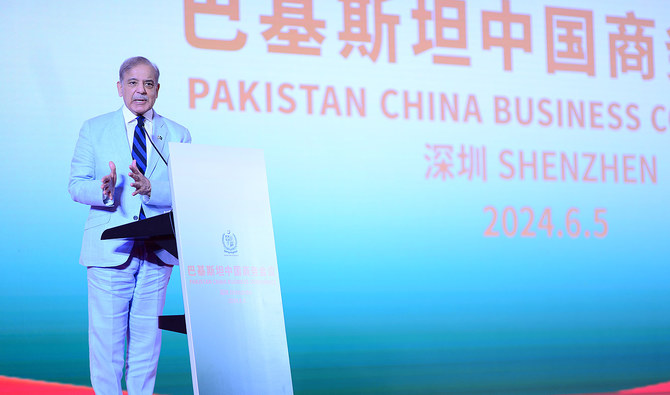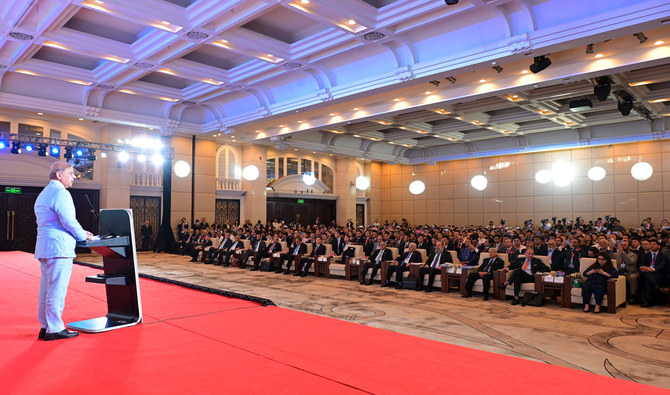ISLAMABAD: Pakistan’s Prime Minister Shehbaz Sharif arrived in Beijing on the second day of his five-day visit to China on Wednesday, he is scheduled to meet the top Chinese leadership including President Xi Jinping and oversee the signing of trade and investment agreements in various fields, amid Islamabad push for enhanced economic cooperation with its ally.
Sharif was received by Chinese Vice Foreign Minister Sun Weidong upon his arrival at the Beijing airport. The premier is accompanied by a high-level delegation comprising the Deputy Prime Minister and Foreign Minister Ishaq Dar and other members of the cabinet and senior officials, a statement from Sharif’s office said.
“The Prime Minister has an extensive program in Beijing reflecting depth and breadth of Pakistan-China ties,” the Prime Minister’s Office (PMO) said.
“He will meet the President, the Premier and the Chairman of the Standing Committee of the National People’s Congress.”
Sharif will also attend a Pakistan-China Friendship and Business event, and hold meetings with the chief executive officers of leading Chinese companies working on the China-Pakistan Economic Corridor (CPEC) projects.
“A number of MoUs between the two countries on cooperation in various fields are likely to be signed,” the statement said.
’FULL SUPPORT’ FOR CHINESE INVESTORS
Earlier, the prime minister said his administration would provide “full support” to Chinese investors entering Pakistan’s market, as the South Asian nation seeks to woo foreign investors amid efforts to stabilize its $350 billion economy.
The premier was speaking at a joint business forum in Shenzhen, a major global technology hub, where he arrived on Tuesday for the first leg of his visit to China from June 4-8. At the top of the agenda are business-to-business meetings and efforts to seek an upgrade for CPEC, a flagship of President Xi Jinping’s Belt and Road Initiative, through which Beijing has pledged over $60 billion in energy and infrastructure Pakistan since 2015.
Islamabad now hopes CPEC collaborations will enter the industrial, IT and agricultural sectors and is encouraging the involvement of the private sector and business-to-business (B2B) engagements.
Around 79 Pakistani companies are in China to attend the business forum in Shenzhen.
“Today is the opportunity, today is the time,” Sharif said in his address to Pakistani and Chinese executives. “Today is the moment for you to capture, sit down with our Chinese friends and brothers and have serious discussions.
“I want to assure you as not only as the prime minister of Pakistan but as the chief executive officer of Pakistan that I will give you full support like never before to promote your efforts to stitch these deals so that Pakistan and Chinese businessmen they benefit jointly have mutual benefits.”
In his address at the forum, Federal Minister for Finance and Revenue Muhammad Aurangzeb laid out the government’s broader roadmap, emphasizing export-led growth and the crucial role of special economic zones. He said Pakistan was seeking foreign direct investment through government-to-government and business-to-business arrangements and aimed to access international capital markets and tap into Panda Bonds, Renminbi (RMB)-denominated bonds from a non-Chinese issuer, which are sold in mainland China.
Aurangzeb acknowledged “temporary hiccups” in payments and repatriations for Chinese companies but assured that such issues would soon be resolved.
Pakistan has frequently sent high-level official delegations to China, its closest regional ally, in the past. However, most of these visits have been to Beijing and revolved around state-level interactions between the top officials of the two countries.
Sharif’s latest visit comes at a time when his administration is actively trying to put Pakistan’s economy back on track amid prolonged financial troubles that have compelled the country to repeatedly urge friendly nations and international lenders for loans.
In recent months, Pakistani authorities have said they are no longer striving to borrow money from allies but asking them to make “mutually beneficial” investments and explore the possibility of collaborating with local businesses.
Chinese investment and financial support since 2013 have been key for the South Asian nation’s struggling economy, including the rolling over of loans so that Islamabad can meet its external financing needs at a time when its foreign reserves are critically low.
B2B MEETINGS
Earlier, the prime minister met with Zhu Zhaojiang, the founder and chairman of Transsion Holdings, a Chinese multinational company specializing in manufacturing mobile phones.
Zhu expressed interest in expanding investment in Pakistan, particularly in mobile manufacturing units and exploring opportunities in electric bikes, modern agriculture and fintech sectors, according to a statement from Sharif’s office.
The prime minister directed federal ministers and Pakistan’s ambassador to China to swiftly develop a plan of action for Transsion and encouraged the company to produce locally and increase exports from Pakistan whose greatest strength was its young workforce.
During the meeting, Zhu informed Sharif about his company’s existing operations in Pakistan, its global exports and plans for further investments, including an already established unit that employs over 5,000 Pakistan nationals.
On Wednesday afternoon, Sharif also visited the Nanshan One-Stop Service Center and Shenzhen Exhibition Museum and directed his ministers to “immediately coordinate with the Center to replicate a similar modern system in Pakistan,” state-run APP reported.
“He was briefed about the digital system established at the Center to register companies and carry out other processes under one roof. He lauded the modern systems developed at the Nanshan One-Stop Services for the registration of companies and businesses,” APP said.
“He also directed the relevant authorities to take necessary measures to establish a similar system in the country with Chinese cooperation.”
The prime minister also visited the Shenzhen Exhibition Museum where he was briefed about the development journey of Shenzhen city, as well as
the headquarters of Huawei in Shenzhen where he was received by the company’s chairman Liang Hua.
“Chairman Huawei informed the Prime Minister about the operations of Huawei around the world, especially in Pakistan, and expressed deep interest in investing in various sectors of Pakistan,” PMO said.
“The Prime Minister appreciated the innovation of Huawei’s operations and encouraged Huawei to expand its investment in Pakistan.”
After a briefing on e-governance, digital banking, telecommunication and artificial intelligence, Sharif invited Huawei to establish Safe City projects on a priority basis in Pakistan, especially in cities where work on CPEC projects was ongoing.
“The government is taking steps to digitize government offices on a priority basis,” Sharif said. “There are vast investment opportunities in Pakistan for a big company like Huawei in the fields of tax system, e-governance and artificial intelligence.”
Sharif also invited the chairman of Huawei to invest in modern technology in the agricultural sector in Pakistan and attended the signing ceremony of a framework agreement between Huawei and the Pakistani science ministry.
Under the framework agreement, Huawei will provide free training to 200,000 Pakistanis in the field of information technology including artificial intelligence and provide full support in the establishment of Safe Cities, e-governance and digitization of the economy in Pakistan.
During the China visit, the Pakistani prime minister will also meet President Xi Jinping and other senior officials in Beijing before concluding the five-day trip on June 8.
Pakistan seeks to woo Chinese investors at business forum, B2B meetings
https://arab.news/ry6gm
Pakistan seeks to woo Chinese investors at business forum, B2B meetings

- Prime Minister Shehbaz Sharif is on five-day visit to China from June 4-8
- Sharif to meet Chinese leadership, including President Jinping, in Beijing
Pakistan launches second indigenous EO-2 satellite from China, SUPARCO says

- Earth observation satellite launched from Yangjiang Seashore Launch Center in China
- EO-2 to enhance disaster response, governance, resource management capabilities
KARACHI: Pakistan has successfully launched its second indigenous Earth Observation satellite, EO-2, from China’s Yangjiang Seashore Launch Center, the national space agency SUPARCO said on Thursday.
The launch marks a significant step in Pakistan’s efforts to strengthen its domestic space and remote sensing capabilities, with the satellite expected to improve imaging continuity, disaster monitoring, agricultural planning and strategic resource management.
In a statement, Pakistan’s SUPARCO said the EO-2 satellite would enhance the country’s earth observation and imaging capabilities and support governance and planning functions across multiple sectors.
“Pakistan’s second indigenous EO-2 satellite has been successfully launched,” SUPARCO said, adding that the mission represents a “milestone” in the expansion of the country’s satellite fleet.
According to the agency, EO-2 will provide critical data for planning and resource management while improving the continuity and accuracy of national earth observation systems.
The satellite is expected to support disaster management, urban planning, environmental monitoring and infrastructure development by supplying updated geospatial imagery and data.
SUPARCO said the launch demonstrates growing indigenous capability in satellite development and reflects Pakistan’s broader objective of strengthening its national space program through locally developed platforms.
Pakistan has gradually expanded its space cooperation with China in recent years, including satellite launches and joint missions, as Islamabad seeks to build technical capacity and reduce reliance on external data sources.
The EO-2 satellite is expected to play a key role in improving data availability for federal and provincial authorities, particularly in areas vulnerable to floods, climate stress and rapid urbanization.











